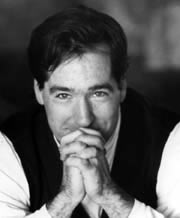
 |
Back to the main performer's List | |
200 State Street Binghamton, NY (607) 217-7334 |
Richard Shindell Word-of-mouth spread quickly, and in 1992 Shindell's debut record appeared. Sparrow's Point on the Shanachie label contains "Are You Happy Now," one of the most gleefully perverse kiss-off songs of all time and a half-dozen other quiet classics. Blue Divide from 1994 did the same, with songs such as "A Summer Wind, A Cotton Dress" and a duet with Lucy Kaplansky on "The Ballad of Mary Magdalen" which made inroads at adult/alternative radio and earned Shindell the moniker "The Nikos Katantzakis of new folk," a reference to the author of The Last Temptation of Christ from at least one waggish reviewer. Quietly, steadily Shindell has paid his dues. Touring regularly at North America's most prestigious festivals ( Newport, Calgary, Kerrville, Winnipeg,etc.), word has begun to spread. He has been the subject of glowing, perceptive reviews in The Village Voice and The New York Times: " Often Shindell tells his stories obliquely, expecting listeners to add up details that reveal the hints of trouble. Mr. Shindell is a lapidary craftsman, matching pared-down imagery to forthright melodies." He has also earned the enthusiastic support of his peers on the touring circuit, which is an informed testament to his great musical gifts. With the new release Reunion Hill, Shindell is ready to take his place as one of the finest singers and songwriters of the day. From the first, hushed notes of the opening track ("The Next Best Western") to the last chords of the final hidden track (a loving rendition of Merle Haggard's "Sing Me Back Home"), Shindell delivers on the promise of his first two albums. Produced my longtime k.d. lang and Bob Dylan string wizard Larry Campbell, Reunion Hill is a vivid document of an artist confidently hitting his creative stride. Bracing arrangements propel the assured writing and crisp folk-rock of the disc. Shindell has long been a master melodicist and on Reunion Hill he weds memorable tunes with unforgettable storytelling. The characters that inhabit Reunion Hill are deftly etched: the grieving Civil War widow of "Reunion Hill," the desperate political fugitive phoning home in "Mae," the stoic single mother of "Money for Floods," the John-Ford-meets-Carlos-Castenada narrator of "Smiling." "I think we nailed it with this record," muses Shindell. "In the past I've noodled endlessly in the studio and worried myself sick about songs and arrangements. With Reunion Hill we were in and out in nine days." Shindell's songs are getting recognized by other performers as well. New-folk diva Dar Williams covered "Nora" and Joan Baez has tapped the Shindell catalog for an unprecedented three songs ("Fishing," "Money for Floods," and "Reunion Hill") for her newest album Gone From Danger. With wider recognition coming his way and the strongest album of his career under his belt, Richard Shindell is poised to make a major leap. As William Ruhlmann wrote in Goldmine, "(Shindell) is a unique talent who sums up the best of the folk movement of the last decade and suggests where it can go from here." ***** Mr. Shindell performs his own songs with grace and suspense. As he picks and strums intricate guitar parts, he sings with a concentration that reveals the tension behind his lyrics. At times, his voice recalls James Taylor, Gordon Lightfoot or Michael Stipe; he stretches words as if he's thinking hard about what they represent. The tone is reflective, but the dilemmas and disappointments couldn't be more vivid. -- JON PARELES, THE NEW YORK TIMES As Big Bill Broonzy put it: "I guess all songs is folk songs. I never heard no horse sing 'em." Some folk songs, however, are better than others. And Richard Shindell's are the best. Dar Williams' version of his stark tale of snowbound desire, "Nora," is no one-off epiphany; Shindell, an ex-seminarian, covers the same territory: conscience, responsibility, obsession with endless invention and variation. (He even took part in the Calgary Folk Festival's Tales of Woe workshop)....Exquisite melancholy and minor chords.--CARRIE FRIED, THE VILLAGE VOICE The most impressive new voice to emerge in folk music so far in this decade...Best of all is the album (Sparrow's Point) leadoff track, "Are You Happy Now?" a sarcastic but pained account of a man whose lover leaves him on Halloween. It isn't just the brilliantly cutting lyrics, it's also the combination of humor and scorn with which Shindell sings that marks him as a major musical figure. -- WILLIAM RUHLMANN, GOLDMINE Richard Shindell captured a full house with a glistening selection of intense, contemporary ballads. Like some musical blend of Kafka, Kierkegaard and Camus, Shindell sang of characters stuck in physical, emotional and spiritual dead-ends, often haunted by real or imagined menace. His voice perfectly suited the material, and at times his singing recalled that of Gordon Lightfoot, Don McLean or his college bandmate John Gorka. Shindell's writing talent probably equals or betters any of the aforementioned. He's got a poet's eye for detail and ear for imagery and a playwright's sense of drama and ambiguity.--SETH ROGOVOY, BERKSHIRE EAGLE Shindell's songs are rich in subtle detail, filled with ragged emotion and unexpected epiphanies. His warm baritone is reminiscent of REM's Michael Stipe. And his delivery is soothing in the same mantric way...Great songs, evocative performance and a voice you can't get tired of hearing. -- ED MCKEON, NEW BRITAIN HERALD |